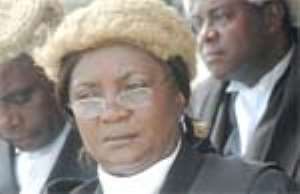
THE CHIEF Justice (CJ), Mrs. Georgina Theodora Wood yesterday swore into office 25 new High Court judges and 2 magistrates to assist in the administration of justice in the country.
In addition, she enrolled 36 new lawyers to the bar to begin their future careers.
At a blissful ceremony at the Chief Justice's court which attracted a lot of family members of those privileged, the CJ, as a duty delegated to her by the President, congratulated the High Court judges comprising 22 men and 3 women.
The magistrates were persons who had gone through all training but could not join their colleagues when they were officially called to the bar.
In her speech, Mrs. Wood noted that the judges, 10 of whom had not yet tasted judicial life, attained this height by dint of hard work.
Talking about the procedure for appointments in the Judiciary, she indicated that as a matter of policy, the Judicial Council required that all persons for promotions and fresh appointments from outside of the Judiciary up to the High Court wrote an examination and submitted at least six judgments; this is in respect of those already on the bench.
For private practitioners, written addresses or statements of case were required after which the entire Judicial Council, if satisfied, would recommend them for appointment.
She reminded the judges that the Oath of Allegiance which they took was not a light undertaking since it was a promise of unalloyed fidelity to the sovereign state of Ghana and service to the good people through the preservation, protection and defence of the Constitution; and so they should let their judgment be principled, well thought-out and well reasoned.
“With these solemn promises to be made freely by you in public without any coercion, it should not surprise you that the good people of the country will justifiably subject your work and conduct to intense scrutiny, demand transparency and hold you accountable for all that emanated from your judgment seat.”
Justice Wood noted that the people had placed much confidence and trust in the Judiciary and expect that “like Caesar's wife”, they lived above reproach.
She entreated judges entering the Judiciary for the first time to bring their rich and diverse backgrounds from the bar, other state institutions and the corporate world to help develop the judicial system.
She assured them that continuous judicial education would be organized for them to promote efficiency.
Family members, the CJ observed, could help judges discharge their duties adequately if they fiercely protected and kept them away from all intruders who might want to take advantage of their relationships to influence them.
“Indeed it is our duty to let our loved ones and family members know that the ground rules which come with our appointment as honorable justices of the Superior Court and indeed all the other courts in our nation are not negotiable,” she advised.
To the new lawyers, she asked that they avoided like a plague, fraudulent activities and conducts that could cause pain and difficulties to individuals, families and other members of the public.
“Your enrolment certificate is only being leased to you and could be withdrawn by striking your name off the role of lawyers if your conduct falls short of the expectation provided in the code of ethics and relevant legislation on the legal profession in this jurisdiction,” she warned.
Justice Wood observed that the discovery of oil in commercial quantities in the country would generate oil and gas-related disputations and would open up new vistas for the country's lawyers. She therefore urged them to undertake oil and gas-related courses at the post graduate level as well as other areas of law to prepare themselves for all the eventualities which were bound to come up.
She announced that the Judiciary was poised to take up the challenge by sending two judges to a prestigious university in Scotland to undertake post graduate courses in this discipline.
She advised the lawyers to use the Alternative Dispute Resolution as an appropriate resolution process before embarking on the long and tortuous journey of litigation, should an out-of-court settlement fail.
The CJ repeated her call on government and old students to assist the Ghana Law School improve on its infrastructure before it celebrates its jubilee anniversary this year.
On his part, the Deputy Attorney General, Kwame Osei Prempeh threw a challenge to the new lawyers not to stay in Accra alone but move to other regions where there are few lawyers to serve the nation better.
By Mary Anane




 Whoever participated in the plunder of the state must be held accountable – Jane...
Whoever participated in the plunder of the state must be held accountable – Jane...
 A vote for John and Jane is a vote to pull Ghana from the precipice of destructi...
A vote for John and Jane is a vote to pull Ghana from the precipice of destructi...
 I’ll repay your abiding confidence with loyalty, understanding and a devotion to...
I’ll repay your abiding confidence with loyalty, understanding and a devotion to...
 ‘I’ve learnt deeply useful lessons for the future' — Serwaa Amihere breaks silen...
‘I’ve learnt deeply useful lessons for the future' — Serwaa Amihere breaks silen...
 I’m sorry for the embarrassment – Serwaa Amihere apologises for leaked sex video
I’m sorry for the embarrassment – Serwaa Amihere apologises for leaked sex video
 Dumsor: Matthew Opoku Prempeh not in charge of Energy sector – Minority
Dumsor: Matthew Opoku Prempeh not in charge of Energy sector – Minority
 Adu Boahen’s murder: Police arrest house help who was in possession of deceased’...
Adu Boahen’s murder: Police arrest house help who was in possession of deceased’...
 Akufo-Addo nominates Felicia Attipoe as Tema West MCE
Akufo-Addo nominates Felicia Attipoe as Tema West MCE
 Election 2024: I can't have someone I defeated twice as my successor – Akufo-Add...
Election 2024: I can't have someone I defeated twice as my successor – Akufo-Add...
